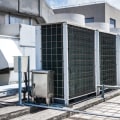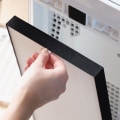When it comes to air filtration, the Merv rating is an important factor to consider. A Merv 8 filter is considered superior filtration compared to air filters with a lower rating, but is it enough for your home? In many cases, a Merv 8 air filter is more than adequate. However, if you are concerned about outdoor air pollution, family members with respiratory problems, or pets in the house, then choosing a higher Merv rating might be a good idea. The Merv range 5-8 can only capture air pollutants of 3.0 microns or greater. As a result, Merv 8 filters capture medium-sized particles such as aerosols, mold and dust.
For most households, this is not enough. Harmful viruses and bacteria will continue to circulate in your home, as will smoke and other forms of air pollution. Yes, a Merv 8 rating is enough for air filtration in average residential homes. A Merv 8 filter can stop mold spores, pollen and most cleaning agents. However, it is important to note that individual circumstances may require a filter with a higher Merv rating.
If you or someone else in your household smokes, you need more filtration than what a Merv 8 provides. Merv ratings quantify the ability to filter particles between 0.3 and 10 microns. If an air filter can capture at least 20% of E1, 65% of E2, and 85% of E3 particulates, it will earn a Merv 11 rating. Most modern HVAC systems have no problem working with higher MERV filters. The main risk of high-efficiency air filters comes from the fact that they are not modified for long periods of time. Activities such as home renovation, leaving doors open to the outside, and children playing around the house can accelerate the accumulation of dust and particles in the air filter.
If you're aware of changing your filters regularly, you're unlikely to experience filter-related issues with your HVAC system. From sizes to types, qualities and more, here's everything you might need to know about air filters: MERV 1 to 4 are effective in controlling larger particles such as sanding dust, spray paint dust, lint and carpet fibers; MERV 5 to 8 capture medium-sized particles such as aerosols, mold and dust; MERV 9 to 12 capture small particles such as bacteria and smoke; MERV 13 to 16 capture very small particles such as viruses and some bacteria. Most air filters have arrows marked to indicate the direction in which air is supposed to flow through them. Technology for HVAC units has progressed since then, and most modern units in recent years should be capable of at least one Merv 8 filter. Fiberglass filters will not be pleated like the rest of the options on this list. In conclusion, a Merv 8 rating is usually good enough for an average household. However, if you prioritize air quality or have family members with respiratory problems or pets in the house, then choosing a higher Merv rating might be a good idea.
It should be clear that you should not try to get down into a rocky Merv filter - consider this answer an unequivocal “yes”.






